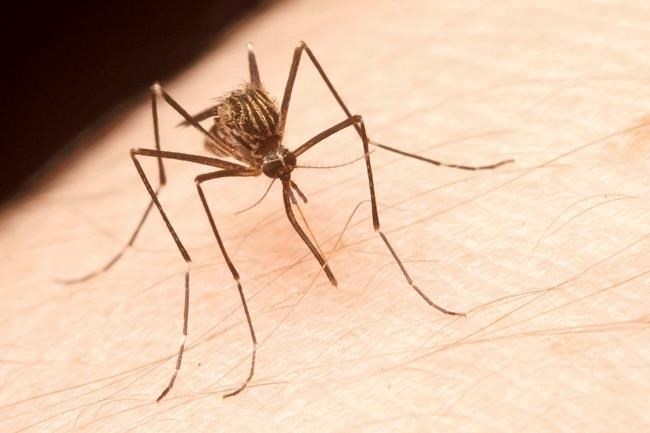
A female aedes japonicus mosquito is seen biting a person in this May 2015 handout photograph. Aedes japonicus is a disease-carrying mosquito which has just been confirmed present in Western Canada.
Image Credit: THE CANADIAN PRESS/HO-Sean McCann
June 05, 2016 - 4:30 PM
PENTICTON - Climate change means the spring melt is coming sooner and the early freshet means more mosquitoes are hatching more often than in past years in the Okanagan.
"I think we’ve all been addressing climate change," Wildsafe B.C. Community Coordinator Zoe Kirk told a recent Okanagan Similkameen Regional District board meeting.
"We started the freshet early for the second time in three years, but this time it was incredibly early, so when the water started to rise, we began getting calls in March about nuisance mosquitoes." Kirk said.
Mosquito Control Program Crew Leader Cindy Boehm said mosquito eggs laid during high water levels can lay dormant for years, hatching during high water events similar to what occurred earlier this year. The result was a huge hatch of mosquitoes, much earlier in the year than normal. She said mosquitoes lay eggs at various water levels, and as those levels recede, new hatches are occurring.
“If we have a rain event, and water levels rise even a little, there’s a new hatch,” she said, adding as weather gets warmer, hatches can occur every three or four days, as opposed to three weeks when weather is cooler.
Boehm said the regional district treatment program uses a naturally occurring bacteria to control mosquitos.
“We don’t fog. If we can get into the water, where they are concentrated, we can kill them,” she said.
Boehm says there are many different species of mosquitoes in the valley, three of which can cause health issues. She says she is already seeing the species that carries West Nile in the South Okanagan this year, a species normally seen later in the summer.
“They are pretty good at spreading heart worm, so it’s a good idea to ensure your pet is on a program through the summer so your dog doesn’t get sick,” she said.
She said there are some concerns about Zika virus spreading into Canada, noting research into the issue is taking place in Winnipeg.
“We’re trying to figure that out. We should know by the end of the year.”
To contact a reporter for this story, email Steve Arstad or call 250-488-3065 or email the editor. You can also submit photos, videos or news tips to the newsroom and be entered to win a monthly prize draw.
We welcome your comments and opinions on our stories but play nice. We won't censor or delete comments unless they contain off-topic statements or links, unnecessary vulgarity, false facts, spam or obviously fake profiles. If you have any concerns about what you see in comments, email the editor in the link above.
News from © iNFOnews, 2016